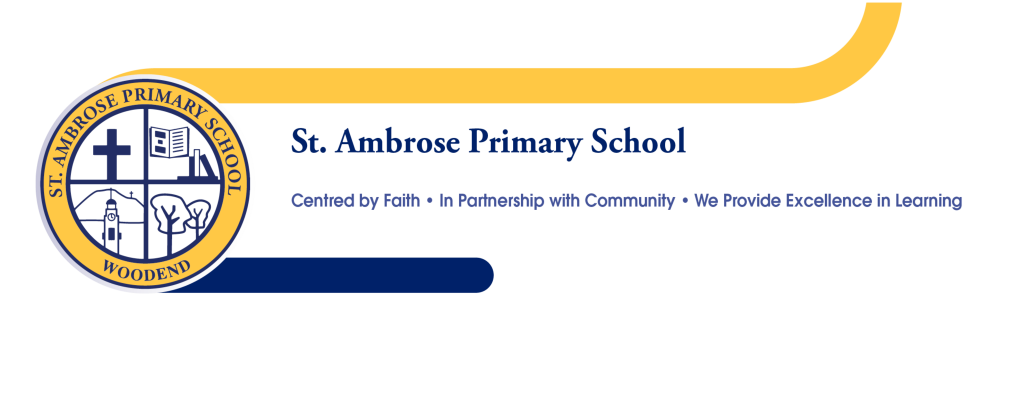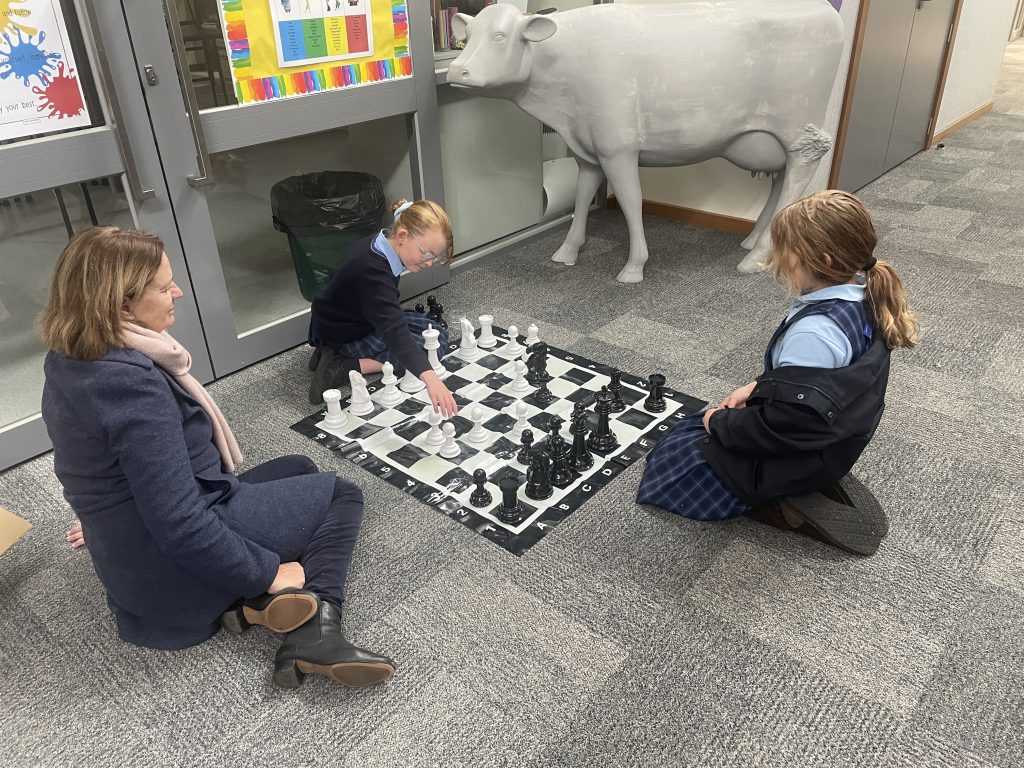St. Ambrose Parish Primary School is a Catholic School and as such, regards the teachings of Jesus Christ and the Catholic Church as central to all of its operations. Therefore, each individual member of the school community is called to imitate Christ in their actions and in their relationships with others.
Student Wellbeing
The wellbeing of the children attending St. Ambrose Parish School is of vital importance to all staff of the school. The classroom teachers have a particular responsibility to the members of their class, but student welfare is a shared responsibility. Older children are encouraged to interact with younger students and to be sensitive to their needs and all children are expected to respect one another.
We are concerned with the welfare of our students in all areas of their development: physically, socially, spiritually, emotionally and academically. We strive to personify the concept of Wellbeing for Learning. The Wellbeing Leader and the Mental Health & Wellbeing Leader have continued to work closely together, strongly supported by leadership to provide wellbeing initiatives. This includes; guided Circle time to support developing friendships, modelling Circle time and Social Stories in classrooms when a need is observed, running the STOP, THINK, DO program for small groups of students, supporting staff with the wellbeing of individual students, and delivering professional learning to the staff during Professional Learning Team meetings and Staff Meetings over the year.
We started the Resilience, Rights and Respectful Relationships (RRRR) program in 2024. Scope and sequences have been designed, staff professional development and training provided, and conversation sessions for members of our community, to answer questions and prepare for the program’s arrival.
Seasons for Growth is now an embedded research-based educational program offered each year to students in Prep to Grade Six who have experienced grief or loss due to a significant change in their lives such as death, divorce, separation, moving schools…etc. This educational program continues to be very beneficial with another three groups facilitated by the Seasons for Growth Companion. Reconnector sessions are offered so that students who had previously completed Seasons for Growth can reconnect with each other and be reminded of the strategies that they have learned.
At St. Ambrose we have continued to strengthen our belief in Wellbeing for Learning with most of our staff completing the Berry Street training. The Berry Street Educational Model (BSEM) training has equipped our school with practical, classroom-based strategies to increase the engagement of all students. As an initial action, our teachers start the school day with Circle Time, a Positive Primer, and prayer which builds connectedness and sets the tone for the day. This educational model enables schools to support students’ self-regulation, relationships, and well-being to increase student engagement and significantly improve academic achievement.
New student-led initiatives included the development of a Cartoon Club, a Colouring Competition, Pom Pom making, and a Dance Group to be run during lunchtime breaks, just to name a few. Our music teacher also facilitates a Ukulele club at lunchtime on Thursdays. Our Ukulele club members even perform to our families and at Bupa Aged Care.
Regular Staff Meetings are dedicated to Positive Behaviour for Learning each school term, with an increased focus on gathering student data, with an aim to support and guide teaching practice. A small team of staff trained in the SWIS data collection platform, which over time, allows staff to analyse behaviour trends across the school. Another student-led initiative was the creation of the PBL Rainbow Certificate to be awarded to a student who receives 100 Bee Tickets throughout the year for regularly demonstrating Responsibility, Respect, Resilience, and Kindness. Two inaugural winners achieved this milestone towards the end of Term 4 in 2023.
Weekly Mental Health & Wellbeing articles continue to feature in our school newsletter, informing our parent community about the latest research, supportive programs, and local services available to them.
Both the Wellbeing Leader and the Mental Health & Wellbeing Leader are members of local and regional networks which strengthen their knowledge and expertise in the area of wellbeing. This is an invaluable network of professionals that informs and supports the school in staying up to date with the latest research, and builds awareness of services that are available to our school community.
The Transition to Secondary School day we run is another way we support our students. it provides the students with opportunities to make new friends and meet staff and students from their future schools.
Year 5 students participate in a ‘Leadership’ session with the Kids Helpline. This equips the students with language, conversation, and knowledge around what it means to be a leader, as they prepared for their transition into grade 6. This session also allowed the students to become familiar with what the Kids Help line can do for them.
The Wonders of Living Program, is offered to our year 5 & 6 families, a sexual education program designed to bring parents and their children together to begin the conversations about puberty and beyond.
The NED program is delivered to the whole school, promoting the messages ‘never give up, encourage others, do your best’ through a fun and interactive performance.
At the end of 2023, St Ambrose received a fully funded scholarship to The Resilience Project (TRP) program, generously provided by Jellis Craig. With TRP’s close cross-curricular links to the Resilience, Rights, and Respectful Relationships curriculum, we accepted the position and rolled out TRP in time for the beginning of 2024.
Student Wellbeing
Goals and Intended Outcomes
Goals:
To implement a whole-school approach to student behaviour management
To implement a whole-school approach to student mental health and wellbeing
Intended Outcomes:
- That PBL practices are embedded across the whole-school community.
- That teachers know their students as learners.
- That students have greater self-efficacy in their learning.
- Embed a whole school wellbeing program in partnership with our community.
Key emphasis is placed on:
- Focus on student voice and agency across the curriculum.
- Embedding PBL (Positive Behaviour for Learning) across the school.
- Develop awareness of the new Child Safe Standards.
- Continue to gather and analysis data on student wellbeing.
- Preparing for the rollout of the Resilience, Rights, and Respectful Relationships Program.
To meet these goals, we, as a school community target the following:
- Providing formal professional learning opportunities to look at discuss the new Child Safe Standards.
- Formalising the role of the Mental Health and Wellbeing Leader within the school.
- Implement the Student Voice Audit Tool.
- Administer PAT Wellbeing Assessment.
- Schedule Staff Meetings and/or PLTs to introduce and discuss as a staff the new Child Safe Standards.
- Providing an induction process for new staff to ensure that PBL is consistent across the school.
- Increasing student leadership opportunities.
- Supporting student initiatives.


